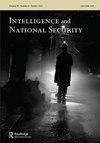The FBI and foreign intelligence in the domestic setting
IF 0.8
3区 社会学
Q1 HISTORY
引用次数: 0
Abstract
ABSTRACT The Federal Bureau of Investigation (FBI) is the United States’ primary domestically-oriented intelligence service. Opportunities for the collection of foreign intelligence exist within the United States. Two narratives regarding foreign intelligence collection run through the primary source record of Bureau history. The first narrative is that foreign intelligence information is a byproduct of the Bureau’s reactive investigations of threats to national security and the second is that the Bureau has exploited opportunities to develop foreign intelligence as a distinct objective. This latter narrative is supported by a lengthy legacy of activities directed at gathering foreign intelligence and at facilitating the collection of foreign intelligence by other agencies. Identifying and selecting a narrative of foreign intelligence collection will help the Bureau to incorporate this consideration into its future evolution.联邦调查局和外国情报机构在国内的作用
本文章由计算机程序翻译,如有差异,请以英文原文为准。
求助全文
约1分钟内获得全文
求助全文
来源期刊

Intelligence and National Security
Multiple-
CiteScore
1.80
自引率
41.70%
发文量
93
期刊介绍:
Intelligence has never played a more prominent role in international politics than it does now in the early years of the twenty-first century. National intelligence services are larger than ever, and they are more transparent in their activities in the policy making of democratic nations. Intelligence and National Security is widely regarded as the world''s leading scholarly journal focused on the role of intelligence and secretive agencies in international relations. It examines this aspect of national security from a variety of perspectives and academic disciplines, with insightful articles research and written by leading experts based around the globe. Among the topics covered in the journal are: • the historical development of intelligence agencies • representations of intelligence in popular culture • public understandings and expectations related to intelligence • intelligence and ethics • intelligence collection and analysis • covert action and counterintelligence • privacy and intelligence accountability • the outsourcing of intelligence operations • the role of politics in intelligence activities • international intelligence cooperation and burden-sharing • the relationships among intelligence agencies, military organizations, and civilian policy departments. Authors for Intelligence and National Security come from a range of disciplines, including international affairs, history, sociology, political science, law, anthropology, philosophy, medicine, statistics, psychology, bio-sciences, and mathematics. These perspectives are regularly augmented by research submitted from current and former intelligence practitioners in several different nations. Each issue features a rich menu of articles about the uses (and occasional misuses) of intelligence, supplemented from time to time with special forums on current intelligence issues and interviews with leading intelligence officials.
 求助内容:
求助内容: 应助结果提醒方式:
应助结果提醒方式:


